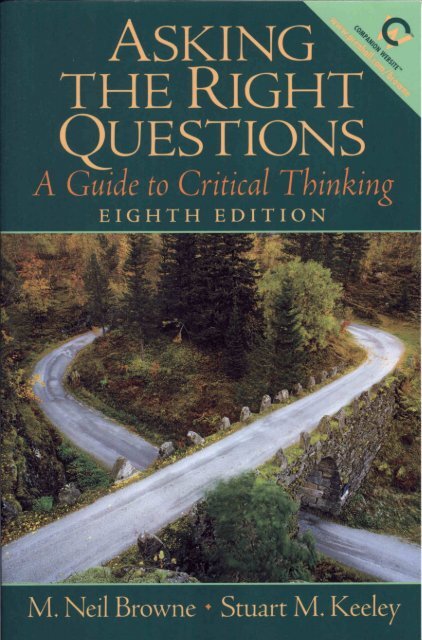
Asking the Right Questions: A Guide to Critical Thinking
In the tapestry of life, we encounter countless situations that demand our thoughtful consideration. From personal dilemmas to societal quandaries, the ability to ask the right questions is an invaluable skill that empowers us to navigate these complexities with clarity and purpose. It is a skill that can be honed through practice, and this guide will provide a comprehensive roadmap for developing your critical thinking abilities.
Critical thinking is a process of active inquiry and analysis that involves formulating well-defined questions, gathering relevant information, evaluating evidence, identifying biases, and drawing informed conclusions. It is a powerful tool that enables us to make better decisions, solve problems, and understand the world around us more deeply. By asking the right questions, we challenge assumptions, uncover hidden insights, and gain a more nuanced perspective on any given topic.
The Importance of Asking the Right Questions
The significance of asking the right questions cannot be overstated. In the realm of science, it is the foundation of groundbreaking discoveries. In the realm of philosophy, it sparks intellectual revolutions. And in the realm of personal development, it leads to profound self-awareness and growth.
When we ask the right questions, we open ourselves up to a world of possibilities. We become more receptive to new ideas, more discerning in our judgments, and more effective in our actions. It is through the act of questioning that we truly begin to understand the world and our place within it.
The Components of a Good Question
A well-formulated question is the cornerstone of critical thinking. It is specific, clear, relevant, and unbiased. A specific question focuses on a particular aspect of the topic, avoiding vague or general inquiries. A clear question is unambiguous and easy to understand, leaving no room for misinterpretation. A relevant question pertains directly to the topic at hand, without introducing unrelated or irrelevant information.
Equally important is unbiased questioning. An unbiased question is free from preconceived notions or assumptions. It seeks to explore the topic objectively, without favoring one particular outcome over another. By framing our questions in this way, we can ensure that our inquiry is fair and impartial.
The Process of Critical Thinking
Critical thinking is a systematic process that involves several key steps. First, we define the problem or question we are seeking to address. Then, we gather relevant information from a variety of sources, including books, articles, research papers, and expert opinions. Next, we evaluate the evidence, assessing its credibility and reliability.
Once we have gathered and evaluated the evidence, we identify any biases or assumptions that may be influencing our thinking. We then draw informed conclusions based on the evidence and our analysis. Finally, we reflect on our conclusions, considering alternative perspectives and evaluating the implications of our findings.
Tips for Asking the Right Questions
Asking the right questions is an art that can be cultivated through practice. Here are a few tips to help you develop your critical thinking skills:
- Start with the basics: Before diving into complex questions, start by asking simple, foundational questions to establish a clear understanding of the topic.
- Be specific: Avoid using vague or general terms. Instead, focus on specific aspects of the topic to ensure your questions are targeted and meaningful.
- Challenge assumptions: Don’t accept everything you read or hear at face value. Question the underlying assumptions and biases in the information you encounter.
- Consider different perspectives: Seek out diverse sources of information to gain a well-rounded understanding of the topic. Different perspectives can shed light on new insights and challenge your own beliefs.
- Reflect on your questions: After asking a question, take time to reflect on its purpose and implications. This will help you refine your questions and deepen your understanding.
By following these tips, you can develop your critical thinking abilities and ask questions that will lead you to a deeper understanding of any topic. Remember, asking the right questions is a skill that takes time and practice. Be patient with yourself and keep learning. The rewards of critical thinking are well worth the effort.
Frequently Asked Questions (FAQ) on Critical Thinking
Q: What is the difference between critical thinking and analytical thinking?
A: Critical thinking involves questioning assumptions, evaluating evidence, and drawing informed conclusions. Analytical thinking focuses on breaking down information into its component parts and examining how those parts relate to each other.
Q: How can I develop my critical thinking skills?
A: Practice asking open-ended questions, challenging assumptions, gathering evidence from multiple sources, and reflecting on your conclusions.
Q: Why is critical thinking important in everyday life?
A: Critical thinking enables us to make better decisions, solve problems effectively, and understand the world around us more deeply. It is a skill that can benefit us in all aspects of our lives.
Conclusion
The ability to ask the right questions is a lifelong skill that can empower us to navigate the complexities of the world with greater clarity and purpose. By embracing the principles of critical thinking, we can become active agents in our own learning and personal growth. I hope you have found this guide helpful in developing your critical thinking abilities. Remember, the journey of questioning is an ongoing one. Continue to ask questions, challenge assumptions, and seek out new knowledge. The pursuit of critical thinking is a rewarding endeavor that will enrich your understanding of the world and your place within it.
Would you like to learn more about critical thinking and how you can apply it in your own life? Visit our website for additional resources and opportunities to develop your critical thinking skills.

Image: amazon.com

Image: youtube.com
Asking the Right Questions: A Guide to… book by M. Neil Browne Asking the Right Questions: A Guide to Critical Thinking, 12th edition. Published by Pearson (July 13, 2021) © 2018. M Browne Bowling Green University; Stuart M